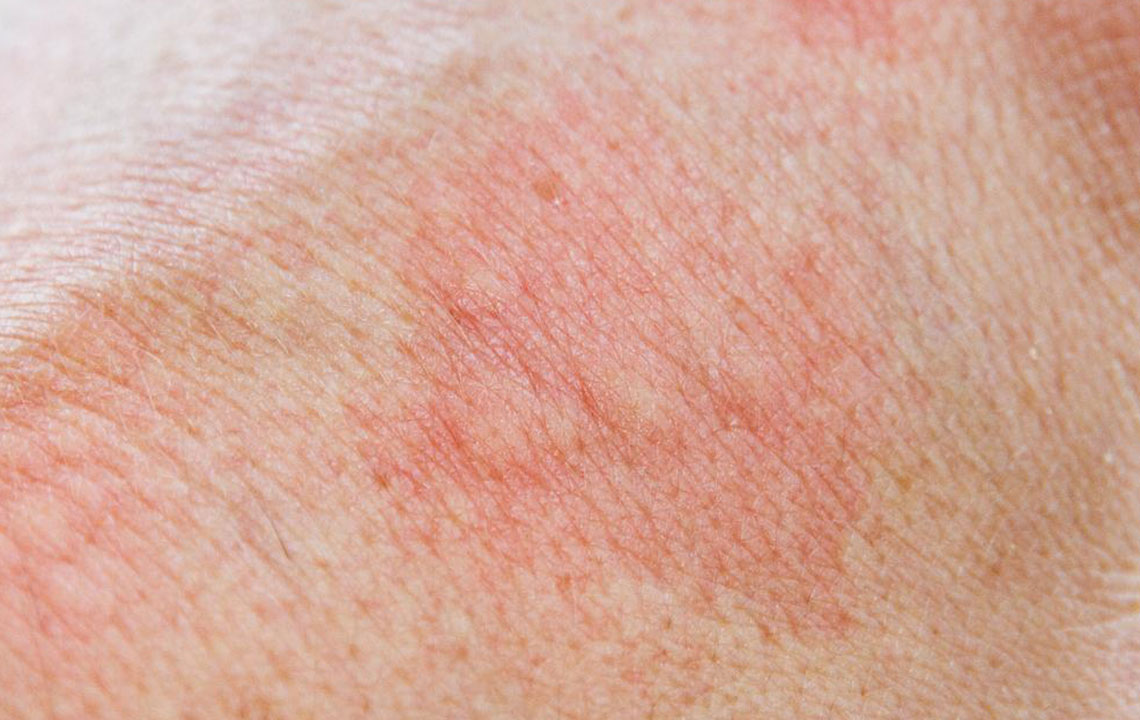Know about the 5 Types of Skin Rashes
Skin rashes can be uncomfortable, hard to get rid of, and embarrassing. They occur in various forms and different parts of the body for various reasons. They can be caused by bacteria, virus, or even fungi. Keeping yourself educated on the types of skin rashes and the reasons why they occur can help you prevent many of them. Here are five types of skin rashes you must know about.
Contact dermatitis
Contact dermatitis is one of the common types of skin rashes that occurs when a person’s skin is directly exposed to the substance they are allergic to. This can also happen with anything else that causes irritation.

Psoriasis
Psoriasis is an autoimmune disease where we see skin cells multiplying at a much faster rate. This is one of the types of skin rashes in which the volume of the cells makes the skin look red and patchy with heavy flaking.
Guttate psoriasis can be caused due to a number of reasons from tonsillitis to beta-blocker medications. It usually starts at a young age and the rash is mainly observed on the torso and the limbs.
Inverse psoriasis is caused when red lesions that occur in areas where the skin folds. These include, but are not limited to the armpits, groin, and the underside of the breasts.
Erythrodermic psoriasis can cause severe illness if left untreated. It usually occurs when medication for a pre-existing psoriasis condition is withdrawn. It can also flare up due to sunburns or infections. Consult your physician immediately if sheets of scaly skin are being shed.
Ringworms
Ringworm is a highly contagious fungal infection and one of the common types of skin rashes that can occur in most parts of the body. As the name indicates, this rash appears in a round or circular shape with raised edges. The skin in the center of the ring appears to be healthy and can be itchy. This rash will spread over the course of the infection, and in some extreme cases, can even merge together.
Ringworms can transfer from person to person or can even be contracted from an animal. Indirect contact, such as the clothes of a person who was infected, can also lead to the occurrence of an infection. Children are more vulnerable than adults.
Ringworm infections can happen due to a host of reasons. Wearing tight-fitting clothing, living in humid and damp conditions, and excessive sweating are all precursors to a ringworm infection. Remember to change your sheets often especially if you share your bed with others.
Lyme disease
Lyme disease is a highly infectious disease. It is transmitted to humans from deer and mice via ticks. Once a tick is infected by biting an infected deer or mouse, it can very easily transfer it to a human. Most people who have Lyme disease do not have any memory of being bit by a tick. People living close to wooded areas are most prone to Lyme disease.
There are three stages of Lyme disease, and the skin rash appears in the first stage; this contributes to it being in the top five types of skin rashes mentioned here. During this stage, also known as the early localized stage, the rash develops at the site of the tick bite. The bite is in itself red and swollen and is encircled by an inflamed ring. This rash will not itch or burn and will disappear in four weeks.
If you notice any such rash, please consult with your physician at the earliest. Lyme disease is best treated when caught early.
Toxic shock syndrome
Toxic shock syndrome is an emergency condition that can be both serious and life-threatening. It is extremely rare. It occurs when the bacterium Staphylococcus aureus enters the bloodstream and produces toxins.
An infection can occur through open cuts or wounds or even when you use tampons. If you experience symptoms or rashes along with headaches and nausea especially after you’ve used a tampon or have had an open wound, consult with your physician immediately. Since this is an emergency condition, it will have to be treated in a hospital.
As you can see, there are many types of skin rashes. Some are infections unto themselves while others are symptoms of larger issues. Remember to note all your symptoms and the history of the rash before you consult with a doctor. Do not try to treat the skin rash yourself.

